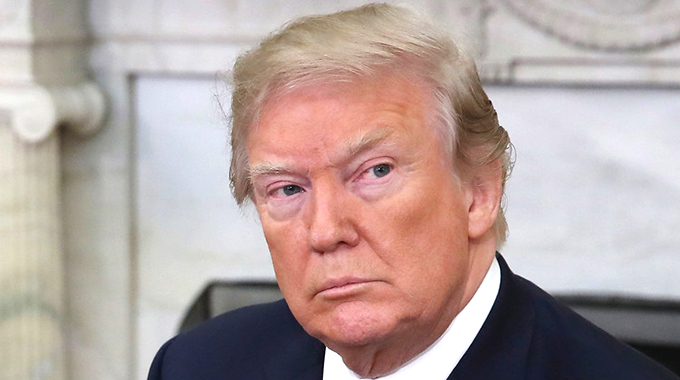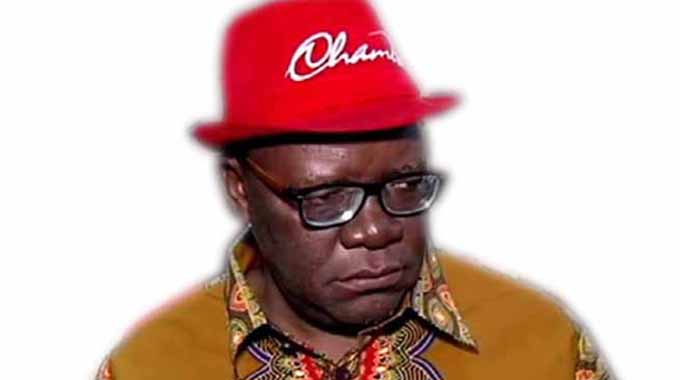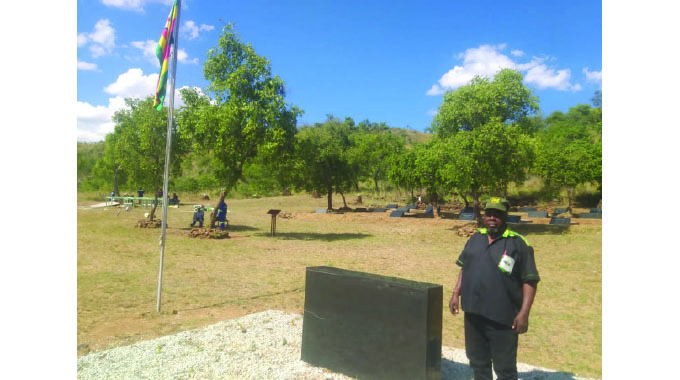We were too hopeful about Zimbabwe . . .

But we should also forgive Donald Trump
Tichaona Zindoga Political Editor
Zimbabwe is back on the international radar following elections that were held on July 30.
Feels like we have been here before.
Yes, we have been.
Anyone who had hoped otherwise is either a hopeless optimist or naïve.
Or perhaps stupid.
The Zimbabwean story — from the events of November that saw our long time ruler Robert Mugabe leave the stage; to the election that was peaceful and credible — was not going to be a fairytale.
It was a story too good to be true — or told: that after the less than perilous November, where no blood spattered the streets of Harare, our small African country would hold peaceful elections and complete the transition like nothing happened.
Just like that!
It was a story that not even our neighbours would love retelling. That Zimbabwe, that country boasting of a top class education system, did it again.
They would be green with envy.
Now Zimbabwe is back to being a normal African nation, thanks to a crisis originating from what Matyszak calls “manufactured dissent”.
Let’s take it from the top again.
The world is being made to believe that there is a crisis in Zimbabwe, emanating from the just-ended elections in the country — the first that were held without Robert Mugabe, who left office last November.
The opposition in Zimbabwe, more specifically the loose coalition of seven parties called MDC-Alliance, is refusing to accept the outcome of the elections and as we write was keeping the world guessing whether they would file a court application to register that disgruntlement.
The essence, and indeed import, of the challenge is also to stop the inauguration of the President — Emmerson Mnangagwa of Zanu-PF — who won the poll with 50.8 percent over nelson Chamisa of the Alliance who managed 44.3 percent.
The parties won 145 seats and 63 respectively, with the remainder of the 210 seats going to an independent and a small party.
Mathematically, Zanu-PF accounted for 70 percent of the total seats a domination which the results of the presidential poll acutely belies — but that has its own reasons, not least because some Zanu-PF cadres half-heartedly campaigned for their presidential candidate.
Which was not unseen and un-foretold, though.
Interestingly, Chamisa has come on record as saying he rejects the results of the presidential election, accepting in principle the parliamentary poll.
Strange logic, but then as we pointed out earlier — it may now be subject to the scrutiny and determination by the courts.
Outside the courts of law, the courts of public opinion have been working overdrive — and is it not what some of the players in the July 30 contest wanted?
We were told beforehand that the electorate actually did not matter outside of endorsing a particular candidate and party; and that when such a determination by the electorate was in dispute or indefinite, the streets would be the arbiter?
August 1, 2018 was set to be the beginning of this rule of the streets and we saw riotous mobs spread a rampage of destruction, looting, arson before they sought to upend the Command Centre of the Zimbabwe Electoral Commission, itself a callous act to prevent results of the elections from being announced.
The Harare International Conference Centre was supposed to go up in smoke, and with it the rule of law in the country.
It would be ungovernable, witnessing a terror, barbarism and lawlessness that would crumble the whole edifice of State.
We were supposed to birth new heroes from stone-throwing, stick-wielding, fire-bombing brigands.
We were supposed to go through difficult, wailing and destructive pangs to birth a dubious creature of a Second Republic (arguably one of those now abused terms in a deep bag of glittering generalities in the field of politics).
It took the stern intervention of the police, who roped in the military, albeit with grave collateral of six dead.
Then, Zimbabwe found a bloody nourishment as a crisis on which world powers pronounced themselves and world news services reeled and rolled into action, making money for themselves and exciting newspeople who otherwise would be bored by a routine, bloodless transition.
And we saw them at HICC on the afternoon of August 1, didn’t we, as the foreign news legion sprang into action at the first stirrings of trouble and how their blood boiled with lustful excitement with the first shots fired.
Zimbabwe became yet another burning African country, enough to give us that familiar pornography of carnage, violence, killings and violence.
But it has not happened that way. Not quite.
Peace was restored and we can assure you that not many people would be willing to risk their lives and limbs for a doubtful political cause.
Ask one Laxton, he will tell you.
The tail wagging the dog?
Over the past few days foreign embassies — Western embassies — have been busy.
The European Union and the United States have entered into the default mode of criticising and threatening the Government of Zimbabwe about the so-called human rights situation in the country.
They have nestled themselves in the opposition corner making dutiful statements intended to pressure and bully Zimbabwe into certain behaviour.
We are not sure if it is the dog wagging the tail or tail wagging the dog.
The opposition in Zimbabwe had been waiting for this moment.
All their bravado derived from the fact that any response of a forceful nature would give the West reason to interfere in the internal affairs of Zimbabwe.
The West also needed an excuse, after the uneventful election season — and had already prepared statements damning enough and reading as though they came from Harvest House in Harare.
On the other end of the world, US lawmakers sympathetic to the opposition prepared a Bill that they laid on the table of President Donald J. Trump at White House.
A couple of days ago, the President of the United States of America signed into law — S. 2779 — the Zimbabwe Democracy and Economic Recovery Amendment Act of 2018, which amends the Zimbabwe Democracy and Economic Recovery Act of 2001.
The new law is touted as an improvement and new conditions for re-engaging Zimbabwe.
Which is what it is not.
Rather, the new sanctions read like an opposition set of demands to the Government of Zimbabwe which the US merely parroted.
And we know that these are the kind of text that was handed to the Americans by the opposition and civil society when the likes Tendai Biti, Chamisa, Dewa Mavhinga and Peter Godwin went to the US a few months back and begged for the extension of the sanctions on Zimbabwe.
Again, we wonder whether it is the dog wagging the tail or the tail wagging the dog.
But here are some of the provision of the offending new sanctions law:
The Government of Zimbabwe takes concrete, tangible steps towards good governance, including respect for the opposition, rule of law, and human rights.
The Government of Zimbabwe holds an election that is widely accepted as free and fair, based on the following pre- and post-election criteria, which was set out
Laws enacted prior to the passage of Zimbabwe’s March 2013 Constitution that are inconsistent with the new Constitution are amended, repealed, or subjected to a formal process for review and correction so that such laws are consistent with the new Constitution.
The Government of Zimbabwe makes significant progress on the implementation of all elements of the new Constitution; and demonstrates its commitment to sustain such efforts in achieving full implementation of the new Constitution.
Traditional leaders of Zimbabwe observe section 281 of the 2013 Constitution and are not using humanitarian assistance provided by outside donor organisations or countries in a politicised manner to intimidate or pressure voters during the campaign period.
You guessed right. The written text is no different from the opposition political demands. And the policy of seeking to meddle in the affairs of Zimbabwe by the US and cause its international isolation remains intact.
This is what Chamisa and co. were praying for.
It is not also lost to us that the other side of punishing Zimbabwe — in general creating harsh economic conditions for ordinary people so that they in turn revolt against their crippled Government — is tied to continued support for the opposition financially and morally.
Which is why the opposition of Zimbabwe, in its treasonous worst, quite revels in the patronage of the West and in particular the Americans.
This opposition misbehaves at home because it has some big brother somewhere.
And this is an issue we could forgive President Trump.
He is a reasonable guy who has sought peace with the world epitomised by that Korean meeting with Kim Jong Un and overtures to Russia (and he says some people don’t want US being friends with Russia).
He probably had not heard about a country called Zimbabwe before the offending bill landed at his desk.
He generally may actually not be interested.
After all, he is concerned about America First.
The problem is that the Congress team that was influential in this (although bipartisan) is that it is infested with Obama administration era malcontents involved in what is likely to be a corrupt relationship with the US Embassy and NGOs in Harare.
Local staff and runners at the embassy and their acolytes in the civic society — apart from being Obama era obsbtructionists — benefit from US isolation and sanctions as they get power and resources to feed their corrupt ilk.
President Trump needs to know this.
Here is a bunch of dishonest, lying, greedy, slimy, venal and unpatriotic individuals that the US would actually punish for collaborating with a foreign power to the detriment of the national interest. These people cannot be said to be representative of Zimbabwe. Instead, the majority they seek to subvert and punish spoke on July 30.
Donald Trump is better informed to know better.







Comments